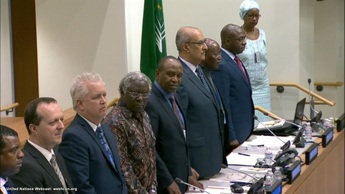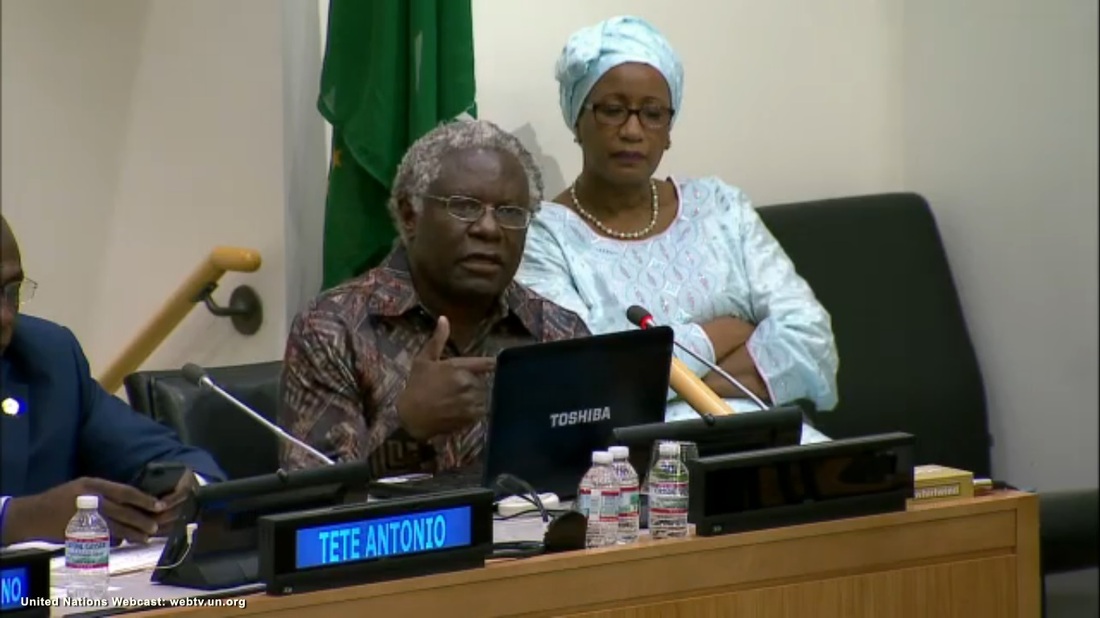 Panel standing during the Anthem of the African Union Panel standing during the Anthem of the African Union May 27, 2014 Recently Africa Day was observed at the United Nations in New York. On this occassion a panel discussion was staged entitled: 'Transforming Africa's Agriculture for Shared Prosperity and Improved Livelihoods: strengthening the AU/UN partnership for tangible impact'. Looking at the panel on stage I could not help but realise that gender balance is still a major challenge at panels and fora like these. Nevertheless several of the panel presenters pointed to the important role of women. The Special Advisor on Africa, Dr. Maged Abdel Aziz from Egypt, as co-organiser stressed the importance of small-holder and family farming in Africa with 80% of farms family owned. Marking the tenth anniversary of the Comprehenstive African Agriculture Development Programme (CAADP), Mr. Abdel Aziz made explicit reference to the successtories of Ghanean cocoa farmers halving poverty levels and the positive experience in Malawi with seed and fertilizer subsidy resulting in a net surplus production, coming from a deficit situation. However, he also noticed that only 6% of arable land is under irrigation. As a result 25% of people in Africa are still food insecure and 30-40% of the children under five face severe accute malnutrition. He emphasized the need to turn current low-yield subsistence farmiing into high-yield agri-business. At the same time the biggest challenge remains the management of fresh water resources. Mr. Abdel aziz also pointed to trade barriers that slow down regional integration, which would be instrumental to achieving food security according to Mr. Abdel Aziz. Leapfrogging Dr. Calestous Juma, Professor of the Practice of International Development and one of the most influential African scholars of this moment, brought his perspective on CAADP and in particular on the Science and Technological Innovation pillar of the CAADP programme. He shared his thoughts about the advantage for Africa of being a late entrant to the development scene, being able to use technologies developed elsewhere and upscaling them rapidly in Africa (for example mobile telephony). "We need to think about different type of universities that are very practical, probably smaller and more directly connected with the agricultural sector. Decentralising the system of higher education so that the universities go to the farmer rather than farmers having to access universities." In terms of the CAADP agenda it is clear that an agricultural development lead industrialisation is now commonly embraced by the African leadership. Along with improved regional integration, making sure lessons from the European integration project are taken on board, Africa can leapfrog ahead on the development path according to Prof. Calestous Juma, one of the panelists and key-note speaker. One of the key policy directions he brought up links to agricultural training: "How do we train our young people in Agriculture. We used to train people for certificates and send them to the labour market in search for a job that does not exist." Prof. Juma suggests a decentralised model of universities closer to agricultural communities with universities better connecting to the agricultural sector.
Gender Prof. Juma also pointed to the important role of women as they are doing most of the farming work. He pointed to the example of the African Rural University for Women in Uganda. Training women in the engineering sciences would be another priority in order to replace Chinese maintenance workers. Succesful pilots of having women prototyping tools for agriculture using a 3D printer have been implemented. You may watch the full panel presentation at UN WebTV.
Albert Mutasa
4/6/2014 03:06:02
I cannot agree more on the need to bring universities to the farmers. I have known several experiments done by farmers that are worth documenting but go to waste. A good example is using water melons buried underground as a means to irrigate during the dry season including use of local shrubs for pesticides: these could be a potential source of organic pesticides to address the environmental concerns and food security. Comments are closed.
|
About meMy name is Reinier van Hoffen. U®Reading
Click here for a summary.
Also find the text of a lecture Dr. Achterhuis held at the 2012 Bilderberg conference. Archives
August 2022
|
AddressNachtegaallaan 26
Ede, the Netherlands |
Telephone+31 (0)6 1429 1569
|
info@uraide.nl
|

 RSS Feed
RSS Feed
















